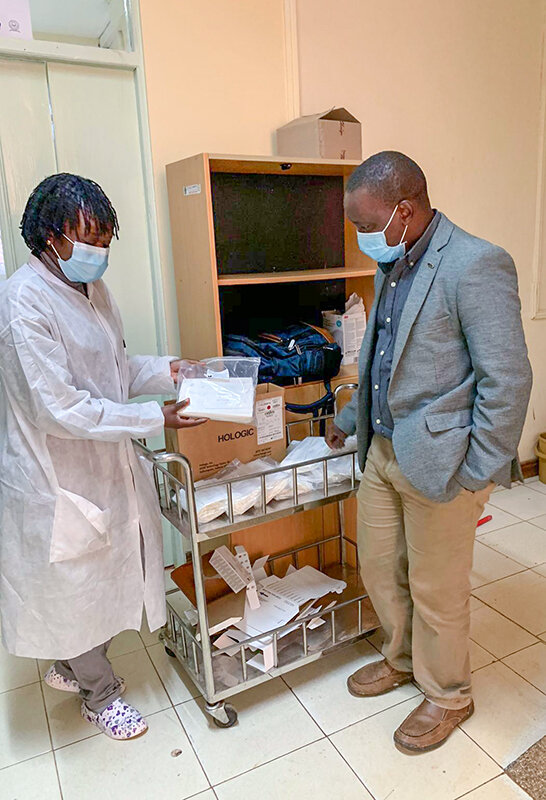Impact of COVID-19 in Kenya Widens
Over the past several weeks, the growth of COVID-19 cases in Kenya accelerated. Though the Ministry of Health reports that ninety percent of the cases are asymptomatic, the pandemic profoundly impacts not only people that have been infected, but also Kenyans who are unable to work or access healthcare due to mitigation measures.
A recent survey among AMPATH’s Eldoret clinic patients showed that 73 percent of those working in the informal sector, such as selling in a market or working as domestic help, had lost work or salary. Fifty-four percent of those responding were short of food at least some of the time.
Research assistants conducting the survey reported, “We find many need assistance in terms of food and facilitation in accessing care, while a few needed mental health support.”
COVID-19 testing swabs funded by AMPATH supporters are delivered to the AMPATH Care Lab in Kenya.
Survey participants shared their own personal trials brought on or exacerbated by COVID-19. One teacher lost her job when her school closed and was evicted by her landlord. She has no money for the medications that she needs to sustain her health.
One women stopped taking her HIV medication because she did not have enough food to prevent the side-effects that occurred when she took them on an empty stomach. Another patient had to walk about 20 kilometers (or about 12.5 miles) in order to get his medication after losing his job during COVID-19.
“From just this small initial sample of patient interviews, the devastating impact of COVID-19 becomes clear,” said Adrian Gardner, MD, MPH, executive director of the AMPATH Consortium. “This situation gives AMPATH the opportunity to live our mission of leading with care, but then going beyond care to provide direct relief and economic support.”
Response from you and other AMPATH supporters is already making a difference by providing food, medication and transportation for patients, as well as needed supplies including testing swabs, pulse oximeters and UV machines to sterilize masks for reuse.
Overall, 16,268 cases of COVID-19 have been identified in Kenya through 266,102 tests leading to an overall positivity rate of 6 percent. Forty-four out of Kenya’s 47 counties report positive cases and 274 deaths have been reported. The overall case fatality rate is 1.7 percent. Of those presenting with symptoms, cough and fever are most common.
Nairobi and Mombasa continue to report the highest number of cases and highest attack rate per 100,000 citizens. However counties in AMPATH’s service area in western Kenya also see rising cases. Busia County reports 677 cases and Uasin Gishu reports 205.
During a briefing this week, Ministry of Health Chief Administrative Secretary (CAS) Dr. Rashid Aman said that it should not be business as usual in Kenya and urged everyone to take the disease seriously. “We must strictly adhere to the containment measures of washing our hands with soap and running water, maintaining social and physical distance, wearing face masks in public places at all times and avoiding all forms of gatherings,” he said.
President Kenyatta has planned a meeting with the Council of Governors for next week to review preparedness and containment measures.

